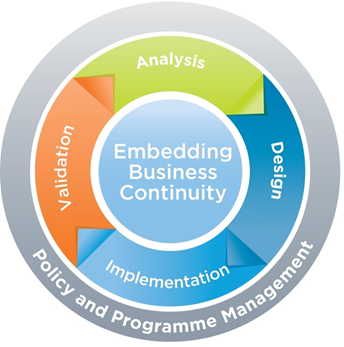We provide complete consultancy and competency building services for BCM implementation in line with NCEMA 7000, ISO 22301 and other established frameworks.
Business Continuity Management (BCM) is a holistic management and governance process that helps protect the organization from financial and non-financial damages caused by minor or major business disruptions. It is said that an effective Business Continuity Plan can reduce the total loss by 90%+.
Implementation of BCM involves:
- Identification of potential risks that may cause disruptions
- Identification of financial and non-financial impact of potential disruptions
- Identification of key products and services, and critical business functions
- Formulation and implementation of viable recovery strategies and plans
- Formulation and implementation of viable recovery strategies and plans
- Awareness, Training, Exercising and testing of these plans
- Regular maintenance, review and updation of the analysis, strategies and plans, to have the assurance and peace of mind that the plans continue at all points in time to support the changing needs of the organization.
We have to date participated in over 40 ISO 22301, NCEMA 7000, BS 25999 engagements, either as the Consultants, Assessors, Technical Experts or Trainers, and have an excellent track record of high quality delivery of BCM engagements within time and cost budget.
Why BCM:
Other than major catastrophes, even minor day to day incidents not managed appropriately can also snowball into major disasters, leading to revenue losses, inability to meet commitments, penalties, embarrassment and loss of reputation, and opening of inroads for competitors, negative publicity, customer and employee attrition and the loss of current and future business. Worst case, the business can be permanently crippled, or may even shut down, never to reopen. BCM works towards ensuring that core, high-priority operations continue after a disaster or resume within an acceptable time.

Consulting
ISO 22301/ NCEMA 7000 is a standard that establishes the process, principles and terminology of business continuity management.
The standard deals with broad goals and is therefore non prescriptive so as to make it applicable to small and large business and local or global organizations. The standard aims to achieve the following.
- Provides a basis for understanding business continuity management
- Provides a means of measurement that is consistent and recognized
- Provides a system based on established good practice

- ISO 22301/ NCEMA 7000 Implementation and Compliance
- Conducting Business Impact Analysis and obtaining signoff
- Conducting BCM Risk Analysis and obtaining signoff
- Developing and signoff of Recovery Strategy
- BCM Plan review
- Conducting BCM Tests and Exercises, including preparation of Exercise report
- Internal Audit of BCM
- Third party Audits of the outsourced on behalf of Principals
- Managed BCM Services and specialized BCM manpower outsourcing
- Maintenance and Assurance Audits
- Conducting of the BCM management Review
- Configuration and implementation of BCM Tools
- Conducting of Mock Certification and pre-assessment audits
- Embedding BCM Culture

